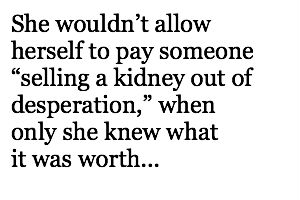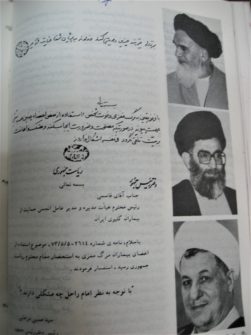
***
In the summer of 2012, in the central office of the Iranian Kidney Patient Foundation (IKF) in Tehran, I sat next to a woman eager to fulfill her deceased father’s will by endowing a portion of his wealth to charity. With the help of the NGO, she planned to distribute the funds among patients unable to afford organ transplants. Since transplantation surgeries are nearly free in public hospitals in Iran, the endowment was to cover the expenses of “acquiring a kidney” from a living donor. “Why not donate the funds to the sellers instead?” asked the social worker in the room who, despite years of employment at the NGO, felt uneasy about facilitating the “sale” of kidneys. Perplexed by the question, the woman explained her wish to alleviate the suffering of those in greatest need—patients who would be bound to dialysis machines for the remainder of their lives unless they received a kidney transplant, an existence that in the Iranian imagination is tantamount to “living death.”
Since the 1980s, when the first successful kidney transplant from a living non-biologically related donor was performed in Tehran, Iranian patients with end-stage renal disease have looked to the bodies of healthy strangers as potential lifelines. When related donors have been scarce, compensating unrelated donors has been customary. As demand for kidney transplantation has grown—spurred by soaring rates of hypertension and diabetes on the one hand and rapid improvements in high-tech surgical interventions on the other—those organizations involved with kidney disease have sought to regulate and routinize the monetary exchanges between donors and recipients. By 1997, the IKF had secured permissive fatwas from a significant number of leading jurists and formalized a set of protocols to be administered across the country. Since then, healthy men and women between the ages of 20 and 40 have been able, under specific conditions, to undergo a nephrectomy to improve the life of a kidney patient in exchange for a small monetary payment from the state and a larger compensation from the recipient. The NGO manages the matching of donors and recipients and announces a standard “reward” amount every year. In practice, most donor-recipient pairs negotiate a different amount based on their unique needs and abilities.
While these monetary exchanges are approved by state policy, authorized by fatwas, and regulated by bureaucratic procedure, they are fraught with moral anxiety and social stigma. Bureaucratic routinization has normalized the transactions to the extent that people understand the “buying and selling” of kidneys to be a social reality and philanthropists can imagine spending their wealth on facilitating such exchanges, but the moral status of the phenomenon remains unsettled. The kidney-seller is seen as an unfortunate victim of poverty and unemployment, and the kidney-buyer the suffering patient whose only hope for continued health and vitality is a new kidney. Their exchange is mostly seen to be regrettable yet unavoidable, but no sustained public discussion has processed the phenomenon from an ethical standpoint or subjected the policy to scrutiny and debate. As a result, there are no consistent moral rubrics for how such transactions should be conducted or how they should be processed by society. In the absence of such rubrics, individuals are left to their own devices to navigate the sticky and tenuous process of reaching an agreement. Even years after transplantation, both kidney givers and patients continue to struggle as they attempt to cope (often in silence and obscurity) with fragile bonds and unresolved apprehensions.
Contrary to what one might expect, the Islamic jurists’ permissive fatwas have neither filled the moral vacuum nor helped resolve the conundrums faced by ordinary people. This is largely because these fatwas were solicited as part of a policy making and implementation process that deliberately excluded the public promotion of organ-selling. After all, there were sufficient people willing to donate for payment, so there was no need to campaign and draw attention to a program that was deemed necessary but morally tenuous and less than ideal. Since the 1980s, members of the IKF, medical doctors, patient activists, and even religious experts have been actively engaging high-ranking jurists in discussions on the science of transplantation and its life-saving potentials. These discussions have persuaded many (though not all) jurists of the expediency of organ transplantation. In turn, policy actors have been able to push forward a national transplantation program without facing overt delegitimization by critics who may otherwise think that selling body parts defies Islamic doctrine. But while these fatwas serve an instrumental purpose for policy actors wishing to lubricate the bureaucratization of transplantation, they do not necessarily serve as guidelines by which donors and patients can navigate the complicated and socially stigmatized process of their exchange. Instead, these individuals’ decisions are largely determined by the fears, desires, and moral valuations that materialize in the space of their intimate encounters.
 In 2012, I spoke with Seema, an extremely frail but affluent accountant and young mother who suffered from multiple ailments that had permanently damaged her kidneys. Doctors and relatives had failed to persuade her to obtain a healthy organ from a living donor. She wouldn’t allow herself to pay someone “selling a kidney out of desperation,” when only she knew what it was worth—“more than anything anyone could pay for.” Even receiving an organ from a brain-dead person was hard to accept. “How can I wait in anticipation of someone’s death so that I can live?” she said. But about a year later, Seema finally agreed to put her name on the IKF’s recipient list. Despair over her declining health and fear of leaving her toddler without a mother had overpowered her previous reservations. She chose to optimize her chances of recovery by receiving a kidney from a living stranger.
In 2012, I spoke with Seema, an extremely frail but affluent accountant and young mother who suffered from multiple ailments that had permanently damaged her kidneys. Doctors and relatives had failed to persuade her to obtain a healthy organ from a living donor. She wouldn’t allow herself to pay someone “selling a kidney out of desperation,” when only she knew what it was worth—“more than anything anyone could pay for.” Even receiving an organ from a brain-dead person was hard to accept. “How can I wait in anticipation of someone’s death so that I can live?” she said. But about a year later, Seema finally agreed to put her name on the IKF’s recipient list. Despair over her declining health and fear of leaving her toddler without a mother had overpowered her previous reservations. She chose to optimize her chances of recovery by receiving a kidney from a living stranger.
Around the same time, I met a disgruntled young donor who had received payment in return for his kidney a year earlier. While he had negotiated the terms of his surgery and exchange himself, the donor complained that the recipient had been “ungrateful” because he had failed to reciprocate his kindness and sacrifice beyond paying the formally agreed-upon amount.
These stories not only demonstrate the range of anxious moral considerations that both animate and challenge paid kidney giving in Iran, but also reflect the normalization of a process in the absence of a consensus on its moral legitimacy, religiously-guided or not. What is particularly interesting is that the majority of those I encountered in Iran, even those who had opted to pay for an organ donation, were unaware of the existence of fatwas explicitly approving the monetized exchange. Some assumed that if any fatwas existed on the matter, they would be prohibitive. Others claimed that they had never asked about such fatwas, but assumed that since the policy was implemented in part by state organizations in an Islamic Republic, it must not have contradicted Islamic doctrine. This shows that the fatwas, despite being deployed for policy purposes, have done so silently and without participating in the formation of public opinion.
There are two major consequences when fatwas are directed toward policy making in this way. One, the legal interpretations of jurists are likely to favor the premises and concerns of the policy actors who have elicited them, rather than the everyday dilemmas of ordinary people like the organ donors and recipients most affected by the policy for compensated kidney transplants. Two, while such fatwas do enable policy making and implementation, they hardly play a role in shaping the public moral understandings necessary for their proper enactment.

Matters are different when successful policy making requires that such policy-oriented fatwas become publicized through incorporation into campaigns (such as those directed toward public health) or otherwise debated in academic settings, journalistic accounts, and most important of all, radio and television programming. It is in these contexts that such fatwas often inform and shape the public’s moral sensibilities and help achieve consensus.
While such public discussion never took place for compensated kidney transplants, it did occur when brain-death organ donation became a viable possibility. Though less than 30% of kidneys transplanted every year come from brain-dead donors, the number is on the rise not only because the infrastructure and logistics accommodating such time-sensitive procedures are improving, but also because more and more Iranians have been embracing the possibility of donating their body parts in the event of brain death as an opportunity for a final grand act of altruism.
The transformation of public attitudes towards brain-death as “real death” has been made possible by a concerted effort to create a “culture of brain-death organ donation.” The Ministry of Health, along with the IKF and other organizations have been working closely with national radio, television, and other media to orchestrate various public campaigns to raise awareness about brain death (among other things through serialized dramas broadcast during peak family viewing times). Nephrologists and neurologists sometimes appear alongside clerics to marshal the cause of brain-death organ donation as a clinically sound, religiously sanctioned, but most of all heroic and spiritually rewarding act. This is all despite the fact that there is more disagreement among jurists on the equivalence of brain death and real death than there is on the legal permissibility of paid kidney giving.
While Western bioethicists often look to the fatwas of Muslim jurists to understand Islamic ethical positions on modern biomedical interventions, we have seen that these fatwas do not always reflect the attitudes of believers on matters of ethical import. When it comes to “kidney selling,” these moral concerns are varied and unstable, dependent as they are on an individual’s relationship and proximity to the context of exchange—as an ailing patient, struggling donor, generous benefactor, passive observer, social critic, and so on. Moreover, fatwas are never automatically efficacious. They must be elicited, mobilized, elaborated, and deployed by the right people, with the right instruments. To understand the ethics of any critical social practice in an Islamic milieu, then, it is paramount both to differentiate between those Islamic legal opinions that are elicited in policy contexts and those that are not, and to examine how policy-oriented fatwas circulate: as contributions to debates over matters of public interest, or as instruments of policy that languish in compendia but rarely see the light of public scrutiny.

